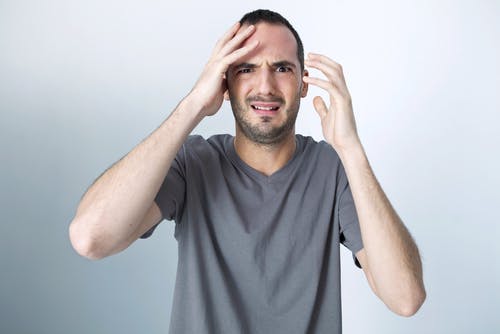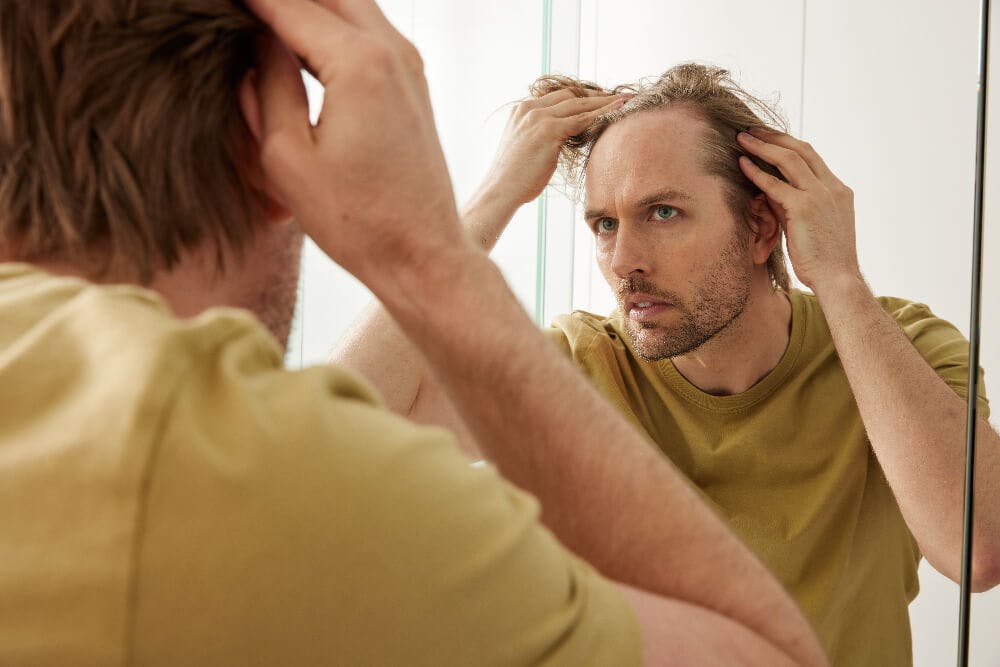What is stress?
Stress is a physiological response to changes or challenges that require a person’s attention or action. It can affect the mind and body and manifest a range of physical and emotional symptoms. This includes fear, worry, difficulty relaxing, increased heart rate, difficulty breathing, disrupted sleep, changes in eating habits, difficulty concentrating and worsening of existing health conditions.[2]
Below are answers to questions related to hair loss due to stress so that you may better understand how stress affects hair growth.
Can hair loss due to stress be reversed?
Telogen effluvium, a type of temporary hair loss, is often caused by stress. However, it is important to identify the specific cause and address it to help hair grow back. Hair loss due to telogen effluvium typically occurs two to three months after a triggering event and resolves after six months after the underlying cause is addressed. In some cases, the rate of hair shedding may slow down but not completely stop.[3]
At Mosh, we can connect you with AHPRA-registered doctors who can provide you with science-backed advice on both hair loss and mental health concerns.
They can help you better understand hair loss due to stress and assess whether it is the case for you. If necessary, your Mosh doctor will schedule a consultation with you, where they may ask about your stress levels and any other potential contributing factors, such as diet, medications, and existing health conditions.
Based on this information, your doctor can narrow down your potential causes of hair loss and provide you with tailored advice or treatment options – whichever suits your needs. This may include medications, lifestyle changes, or other therapies to help manage stress and promote hair growth, but this will depend on what your doctor sees fit for your situation.
Is there a way to prevent thinning hair due to stress?
A crucial part of managing or preventing hair loss due to stress is counselling the patient about the natural hair cycle and the relationship between triggers and the timing of hair loss. It is important to understand that stress is a common contributor to this condition; hence, stress management may help prevent stress related hair loss.[3]
If you want to know how to reduce stress or how to manage stress, your Mosh health practitioner will happily address those questions for you. To get started, simply fill out the free health quiz on our platform, and a Mosh health practitioner will review your information. If needed, your health practitioner will schedule a virtual consultation with you to discuss the suitability of a personalised mental health treatment plan for you.
You can also ask your Mosh doctor about which vitamin deficiency causes hair loss and if there are appropriate over-the-counter products for you that may address your concern. If your doctor recommends Mosh hair growth products and you agree to use them, you can order them through our platform for delivery to your home. Alternatively, you can use our subscription service to restock them as needed.
What treatments are available for stress-related baldness?
The treatment for hair loss due to stress depends on the underlying cause. Once a doctor identifies the trigger, it’s possible to treat the condition through these treatment options:
- Correcting nutritional deficiencies through diet changes
- Non-surgical hair replacement methods
- Hormone replacement therapy for those experiencing menopause
- Counselling to manage stress or anxiety[4]
You have complete freedom to accept or decline any treatment recommendations made by your Mosh doctor. You may also request an alternative solution or switch to a different Mosh doctor if you do not feel your current doctor is a good fit for you.
If you agree to a Mosh hair loss or mental health treatment plan recommended by your Mosh doctor (if it fits your situation), you will receive ongoing consultations with your doctor to track your progress and make any necessary adjustments to the plan.
At Mosh, we understand that it can be difficult to talk about hair loss or mental health issues. Please know that we are here for you whenever you are ready to address these concerns.
If and when you are ready, don’t hesitate to reach out to us for support!

